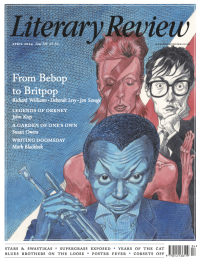James Campbell
In the Beginning was the Word
James
By Percival Everett
Mantle 320pp £20
Writing to the artist Romare Bearden in 1986, Ralph Ellison lamented, ‘After all these years some of us are still beefing over Huckleberry Finn.’ Complaints about Mark Twain’s novel had surfaced regularly since its publication one hundred years earlier, principally over its portrayal of the runaway slave Jim as at once an item of property and a human being of little worth. The book’s language makes some readers uncomfortable: Huck’s liberal use of a notoriously unprintable word (over two hundred instances) was controversial even in the 19th century, as was the innovative vernacular voice in which Huck recounts his lawless adventures. To Bearden, Ellison proposed giving the latter-day grievance mongers ‘the advice given a mouthy, knuckle-headed character in an early musical’: ‘“Brother, go ’way back and sit down!” To which I’d add, “And while you’re at it, do yourself some reading!”’
The escaped slave of Twain’s novel has been doing quite a lot of reading himself lately, if Percival Everett’s meta-version of the story – which more or less sticks to the narrative trajectory of the original – is anything to go by. His devotion to the written word was evidently acquired before we encounter him on the opening page of James – Huck’s ‘ole Jim’ has claimed his proper name – and it has given him ideas. Not mere ‘ideas above his station’, which is what his owners in St Petersburg, Missouri, would think if they were to hear him now, but also fancy concepts of ‘double irony’ and questions about whether ‘one irony [can] negate another’. Here, James’s mental acuity enables him to hold a dream conversation about hypocrisy on the banks of the Mississippi with the philosopher John Locke. Voltaire makes an illusory appearance, too, assuring James that he is in agreement with Montesquieu: ‘I think we are all equal, regardless of color, language or habit.’ Voltaire’s hesitant qualifications fail to impress, however, and the debate heats up. ‘Let me try this,’ James lectures the Frenchman. ‘You have a notion, like Raynal, of natural liberties, and we all have them by virtue of…’ But just then Huck appears and Voltaire dissolves in the mist. ‘You sho talk funny in yer sleep,’ Huck says. ‘Who is Raynal?’ Jim keeps the Enlightenment thinker’s identity to himself. ‘He be a slave I knowed from way back.’
In Twain’s novel, first published in 1884 (in England, as it happens), Jim goes on the run after learning that his owner, Miss Watson, is planning to sell him down the river to New Orleans. Huck is unhappy at home for a different reason: his father is a brute.

Sign Up to our newsletter
Receive free articles, highlights from the archive, news, details of prizes, and much more.@Lit_Review
Follow Literary Review on Twitter
Twitter Feed
Knowledge of Sufism increased markedly with the publication in 1964 of The Sufis, by Idries Shah. Nowadays his writings, much like his father’s, are dismissed for their Orientalism and inaccuracy.
@fitzmorrissey investigates who the Shahs really were.
Fitzroy Morrissey - Sufism Goes West
Fitzroy Morrissey: Sufism Goes West - Empire’s Son, Empire’s Orphan: The Fantastical Lives of Ikbal and Idries Shah by Nile Green
literaryreview.co.uk
Rats have plagued cities for centuries. But in Baltimore, researchers alighted on one surprising solution to the problem of rat infestation: more rats.
@WillWiles looks at what lessons can be learned from rat ecosystems – for both rats and humans.
Will Wiles - Puss Gets the Boot
Will Wiles: Puss Gets the Boot - Rat City: Overcrowding and Urban Derangement in the Rodent Universes of John B ...
literaryreview.co.uk
Twisters features destructive tempests and blockbuster action sequences.
@JonathanRomney asks what the real danger is in Lee Isaac Chung's disaster movie.
https://literaryreview.co.uk/eyes-of-the-storm